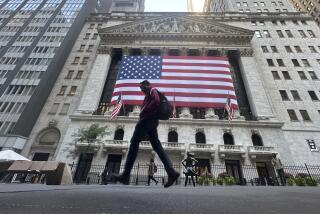Glad tidings give markets a boost
Most stocks rose Friday after more encouraging words from the Federal Reserve and signs that the Treasury Department was finalizing a plan to prevent thousands of Americans from losing their homes.
Shares of mortgage lenders, home builders and bond insurers rose sharply on reports the government and major banks were working on a pact that would temporarily freeze interest rates on some sub-prime home loans.
The major stock indexes ended the week with gains but still posted big declines for November.
The Dow Jones industrial average climbed more than 150 points early in the session after Fed Chairman Ben S. Bernanke gave investors more reason to believe further interest rate cuts could be on the way. But the market gave back a big chunk of that advance, a fizzle that was perhaps to be expected after stocksâ huge gains Tuesday and Wednesday. Tech stocks slid in the wake of weak earnings from Dell, pulling down the Nasdaq composite index.
In a speech late Thursday, Bernanke predicted âhead winds for the consumer in the months aheadâ because of persistently tight credit conditions, the housing slump and high energy prices, and said the central bank would have to be âexceptionally alert and flexible.â
The comments echoed those of Fed Vice Chairman Donald L. Kohn earlier in the week, which helped Wall Street recover some of its recent steep losses. Investors read the remarks from the Fed officials as evidence the Fed was willing to lower interest rates again after cutting them at its last two meetings.
âAlthough the U.S. is in the eye of the credit storm, weâve seen the Fed cut rates and weâve heard from Bernanke that they are prepared to do so again if necessary,â said Robert Jukes, global equity strategist at Collins Stewart in London.
The Fedâs next meeting is Dec. 11, and a rate cut could help reinvigorate the slowing economy. Evidence of a more reticent consumer came Friday as the Commerce Department reported that consumer spending rose a modest 0.2% in October, the slowest pace in four months.
The risk of rising inflation had been keeping the central bank cautious about loosening its policy. But that risk looks less threatening now, given that oil prices dropped Friday below $90 a barrel for the first time since October and one of the Fedâs preferred inflation measures came in within the desired range.
The Dow Jones industrial average rose 59.99 points, or 0.5%, to 13,371.72.
Broader stock indicators were mixed. The Standard & Poorâs 500 index rose 11.42 points, or 0.8%, to 1,481.14, and the tech-dominated Nasdaq composite index fell 7.17 points, or 0.3%, to 2,660.96.
The Russell 2,000 index of smaller-company stocks rose 1.71 points, or 0.2%, to 767.77.
Advancing issues outnumbered decliners by more than 2 to 1 on the New York Stock Exchange.
Yields on government securities were mixed. The benchmark 10-year Treasury note finished at 3.94%, unchanged from late Thursday.
The dollar rose against other major currencies. Gold prices declined.
Crude oil futures fell $2.30 to $88.71 a barrel -- the lowest level in more than a month -- on the New York Mercantile Exchange.
Stocks saw big gains for the week, overcoming a sharp drop Monday that pulled the Dow and the S&P; 500 more than 10% below their Oct. 9 record closes. Over the next four days, the Dow jumped about 630 points, or nearly 5%, on improving prospects for an interest rate cut and news that embattled financial companies such as Citigroup, Freddie Mac and E-Trade Financial were raising cash. The developments bolstered investorsâ confidence that credit problems were waning.
For the week, the S&P; 500 added 2.8%, the Dow gained 3% and the Nasdaq rose 2.5%.
But November was dominated by credit concerns and recession fears. For the month, the Dow fell 4%, the S&P; 500 lost 4.4% and the Nasdaq tumbled 6.9%.
On Friday, a gauge of home builders jumped 8.7%, led by D.R. Horton, which rose $1.50, or 14%, to $11.97. Irvine-based Standard Pacific soared 56 cents, or 19%, to $3.46. Standard Pacific is down 87% this year.
Financial stocks in the S&P; 500, battered for months because of their link to mortgage troubles, climbed 2.9% on Friday.
Countrywide Financial jumped $1.52, or 16%, to $10.82; Washington Mutual surged $1.49, or 8.3%, to $19.50; Freddie Mac soared $5.56, or 19%, to $35.07; and Citigroup rose $1.01, or 3.1%, to $33.30.
JPMorgan Chase rose $1.97, or 4.5%, to $45.62 for the top gain in the Dow average. Wells Fargo gained $1.89 to $32.43. Bank of America rose $1.50 to $46.13. Bond insurer Ambac Financial Group jumped $3.82, or 16%, to $27.23.
For the week, financial shares were up 5.6%.
The tech sector was hurt Friday by a murky outlook from Dell, cautious analyst comments on Research in Motion and a wary Goldman Sachs note on technology in general.
Dell tumbled $3.60, or 13%, to $24.54, and Research in Motion sank $8.26, or 6.8%, to $113.82.
Stocks gained overseas. Key indexes rose 1.1% in Japan, 0.6% in Hong Kong, 1.3% in Britain, 1.4% in Germany and 1.3% in France.
More to Read
Inside the business of entertainment
The Wide Shot brings you news, analysis and insights on everything from streaming wars to production â and what it all means for the future.
You may occasionally receive promotional content from the Los Angeles Times.










